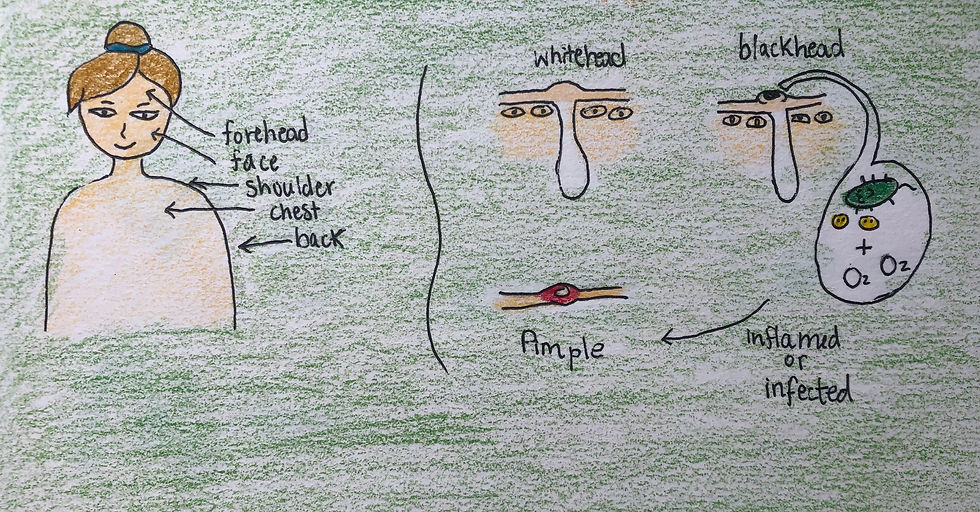What Causes Acne?
- Science Holic
- Apr 30, 2021
- 2 min read
Author: Jiahao Wu
Editors: Peggy Yang, Michael Zhu
Artists: Susan Wu

We panic when pimples and acne starts appearing on our faces, rush to apply acne treatment products, and put on face masks, praying that they will go away. But most products don’t work immediately. Why? Why don't the pimples just go away the second you wash them with a benzoyl peroxide cleanser? The basic answer is puberty—hormones. Acne is caused by the imbalance of hormones which means they need time to go away.

Acne is a skin condition that occurs when your hair follicles are blocked by oil and dead skin cells. Common types of acne include blackheads, whiteheads, and pimples. Although it is most common in teenagers and young adults, it can happen to anyone at any age. There are four main causes of acne: excess sebum (oil) production, hair follicles clogged by dead skin cells and oil, bacteria, and inflammation. Acne usually appears on your face, forehead, chest, upper back, and shoulders because oil production happens mostly in these areas of skin. The difference between a whitehead and a blackhead is whether the pores are closed or not. A whitehead forms when dead cells and oil are trapped under the skin and unable to break out. On the other hand, blackheads that look like dirt stuck in the skin are caused by bacteria and oil that turn dark and oxidize when exposed to the air. Pimples are red spots with white centers that occur when the blocked hair follicle becomes inflamed or infected. However, other glands on the skin aren’t usually associated with acne.

What makes acne worse? There are many factors but hormonal changes during puberty during teenage years are the most common. However, certain medications such as drugs that contain corticosteroids, testosterone, or lithium can also trigger acne. For example, during menstrual cycles, the body will release the testosterone that causes acne to form. Also, diets including fatty and carbohydrate-rich foods may worsen acne. Stress can also exacerbate acne because it triggers the release of hormones and oils in the body.
Some acne myths are proved to be false. For example, eating chocolate and greasy foods have almost no effect on acne. Oil-free cosmetics and makeup don’t have much impact on acne either. Hygiene also isn't a major factor causing acne. On the contrary, rubbing your face too hard or cleaning it with harsh soaps and chemicals can irritate your skin and make your pores open up to acne-inducing bacterias.

It is essential to take care of your skin and make necessary adjustments to your routine to prevent acne. Using non-irritating products and keeping your hands and phone away from your face will help keep your skin healthy. Consulting a dermatologist before using an unfamiliar skincare product is another way to prevent sudden breakouts.
Citation:
“Acne - Symptoms And Causes.” 2021. Mayo Clinic.
Ghahreman, Tanya. “How to Tell the Difference Between Stress Acne and All Other
Breakouts.” Byrdie, 27 Jan. 2021, www.byrdie.com/what-is-stress-acne-4775239.



Comments